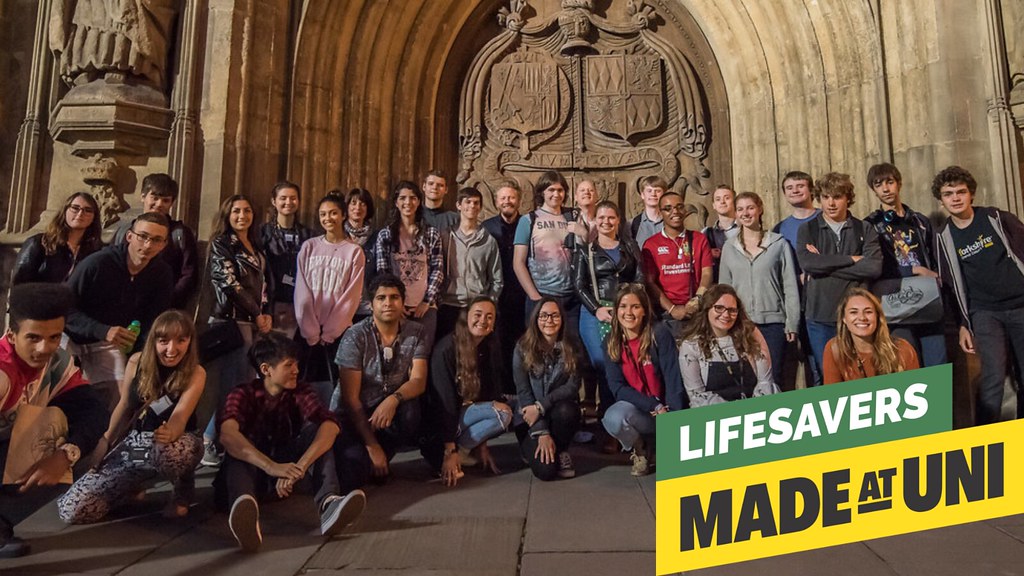The efforts of Bath’s Centre for Applied Autism Research (CAAR) to improve access and opportunities for the autistic community have been singled out by Universities UK (UUK) as part of its latest #MadeAtUni campaign, which launches today (Thursday 16 May).
The initiatives from CAAR, which include the UK’s only autism summer school, a unique autism employment school and free online courses and resources designed to help parents and carers of autistic people, form part of UUK’s ‘Nation’s Lifesavers’ list: a celebration of the top 100 individuals or groups based in UK universities whose work is making a life-changing difference to people’s health and wellbeing.
Despite growing awareness of autism, those living with the condition still face considerable challenges in education and in the workplace. For example, latest figures from the National Autistic Society show that just 16% of autistic adults are in full time work, with four in 10 saying they have never worked.
The Centre for Applied Autism Research (CAAR) at the University of Bath hopes to change this by working with the autistic community to develop new insights into the condition and to develop practical solutions to the issues that the community identify as important.
Every year the centre runs the UK’s only autism summer school to give prospective students from any university an opportunity to learn about support available and develop strategies for dealing with change. It also hosts an autism employment school in partnership with JPMorgan Chase which has put in place autism-friendly measures to improve the employment rate among autistic people.
CAAR also runs a range of free, online four-week courses designed to support parents and teachers of autistic children, matching digital resources to children’s needs and capabilities. These initiatives and CAAR’s research are focused on improving both access and opportunities for the autistic community so that all of society benefits from the unique set of skills autistic people offer.
CAAR Director, Professor Mark Brosnan, explains: “Our main objective at CAAR remains to take relevant research about autism and to translate it into practice so that those living with autism have the same opportunities as the wider population, in particular when it comes to education and employment.
“Autism in many ways is a complex condition, but conversely solutions which we can put in place to improve people’s education and employment opportunities can be relatively simple to set-up and cost-effective to run.
“We are really pleased to see the impact our work is having, not just for those who attend our summer school or employment school, but across wider society too. It is a fantastic endorsement to be recognised by UUK in this way.”
University of Bath Honorary Graduate, Professor Dame Uta Frith, who officially opened the Centre for Applied Autism Research back 2016, said: "In the course of my own lifetime I have seen growing awareness and interest in autism. Still, where we now know much more about autism than even 20 years ago, so many challenges still persist for those living with the condition. But we can work together to overcome them.
“If we are to make the world a more autism-friendly place, the most important thing we as scientists can do, is to apply theory to practice. That’s why I’m so excited about the initiatives pioneered by the Centre for Applied Autism Research at the University of Bath. They show that it is possible to make a real, tangible difference to the lives of people living with autism.”
Vice-Chancellor and President, Professor Ian White, added: “It is an honour for the Centre for Applied Autism Research to be included as part of UUK’s list of the nation’s lifesavers in recognition of the contributions it makes to improving health and wellbeing. This is a hugely important area of applied research where the University of Bath can, and does, make a tremendous impact across society.”
On the wider campaign, Professor Dame Janet Beer, President of Universities UK, explained: “Every day, up and down the country, universities are also working on innovations to transform and save lives. Research taking place in universities is finding solutions to so many of the health and wellbeing issues we care about and the causes that matter. This campaign is a chance to bring to life the wonderful and often unexpected work going on every day in our universities and to celebrate some of the people working to make a life-changing difference to us all.”

